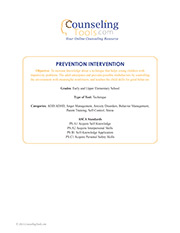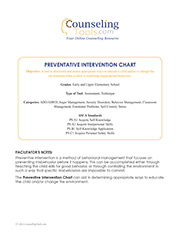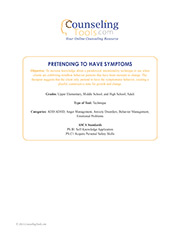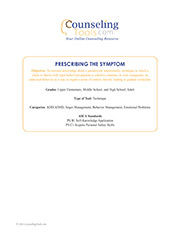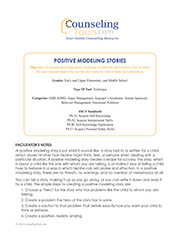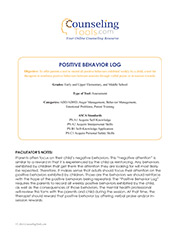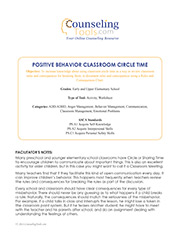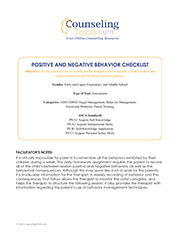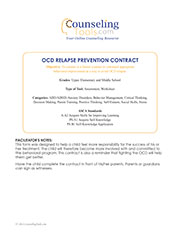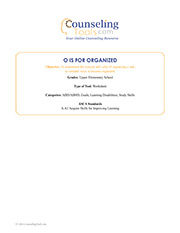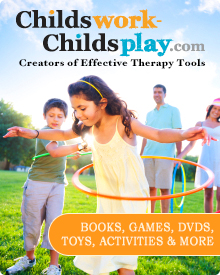-
-
TopicsADD/ADHD, Anger Management, Anxiety Disorders, Behavior Management, Parent Training, Self-Control, Stress
- Objective
To increase knowledge about a technique that helps young children with impulsivity problems. The adult anticipates and prevents possible misbehaviors by controlling the environment with meaningful reinforcers, and teaches the child skills for good behavior.
- Types of ToolsTechnique
- GradesEarly Elementary School, Upper Elementary School
- ASCA StandardsPS:A1: Acquire Self-Knowledge, PS:A2 Acquire Interpersonal Skills, PS:B1 Self-Knowledge Application, PS:C1 Acquire Personal Safety Skills
- Number of pages3
-
-
-
TopicsADD/ADHD, Anger Management, Anxiety Disorders, Behavior Management, Classroom Issues, Emotional Problems, Self-Control, Stress
- Objective
A tool to document and assess appropriate ways to educate a child and/or to change the environment when a child is exhibiting inappropriate behaviors.
- Types of ToolsAssessment, Worksheet
- GradesEarly Elementary School, Upper Elementary School
- ASCA StandardsPS:A1: Acquire Self-Knowledge, PS:A2 Acquire Interpersonal Skills, PS:B1 Self-Knowledge Application, PS:C1 Acquire Personal Safety Skills
- Number of pages2
-
-
-
TopicsADD/ADHD, Anger Management, Anxiety Disorders, Behavior Management, Emotional Problems
- Objective
To increase knowledge about a paradoxical intentionality technique to use when clients are exhibiting mindless behavior patterns that have been resistant to change. The therapist suggests that the client only pretend to have the symptomatic behavior, creating a playful, constructive tone for growth and change.
- Types of ToolsTechnique
- GradesAdult, High School, Middle School, Upper Elementary School
- ASCA StandardsPS:B1 Self-Knowledge Application, PS:C1 Acquire Personal Safety Skills
- Number of pages3
-
-
-
TopicsADD/ADHD, Anger Management, Behavior Management, Emotional Problems
- Objective
To increase knowledge about a paradoxical intentionality technique in which a client or family with rigid behavioral patterns is asked to continue, or even exaggerate, an undesired behavior as a way to regain a sense of control, thereby leading to gradual extinction.
- Types of ToolsTechnique
- GradesAdult, High School, Middle School, Upper Elementary School
- ASCA StandardsPS:B1 Self-Knowledge Application, PS:C1 Acquire Personal Safety Skills
- Number of pages3
-
-
-
TopicsADD/ADHD, Anger Management, Asperger's Syndrome, Autism Spectrum, Behavior Management, Emotional Problems
- Objective
To increase knowledge about a technique in which the adult creates a story to share; the main character models the way the adult wants the child to think, feel, and behave.
- Types of ToolsTechnique
- GradesEarly Elementary School, Middle School, Upper Elementary School
- ASCA StandardsPS:A1: Acquire Self-Knowledge, PS:A2 Acquire Interpersonal Skills, PS:B1 Self-Knowledge Application, PS:C1 Acquire Personal Safety Skills
- Number of pages3
-
-
-
TopicsADD/ADHD, Anger Management, Behavior Management, Emotional Problems, Parent Training
- Objective
To offer parents a tool to record all positive behaviors exhibited weekly by a child; a tool for therapists to reinforce positive behaviors between sessions through verbal praise or in-session rewards.
- Types of ToolsAssessment
- GradesEarly Elementary School, Middle School, Upper Elementary School
- ASCA StandardsPS:A1: Acquire Self-Knowledge, PS:A2 Acquire Interpersonal Skills, PS:B1 Self-Knowledge Application, PS:C1 Acquire Personal Safety Skills
- Number of pages2
-
-
-
TopicsADD/ADHD, Anger Management, Behavior Management, Classroom Issues, Communication, Emotional Problems
- Objective
To increase knowledge about using classroom circle time as a way to review classroom rules and consequences for breaking them; to document rules and consequences using a Rules and Consequences Chart.
- Types of ToolsActivity, Worksheet
- GradesEarly Elementary School, Upper Elementary School
- ASCA StandardsPS:A1: Acquire Self-Knowledge, PS:A2 Acquire Interpersonal Skills, PS:C1 Acquire Personal Safety Skills
- Number of pages3
-
-
-
TopicsADD/ADHD, Anger Management, Behavior Management, Emotional Problems, Parent Training
- Objective
- Types of ToolsAssessment
- GradesEarly Elementary School, Middle School, Upper Elementary School
- ASCA StandardsPS:A1: Acquire Self-Knowledge, PS:A2 Acquire Interpersonal Skills, PS:B1 Self-Knowledge Application, PS:C1 Acquire Personal Safety Skills
- Number of pages3
-
-
-
TopicsADD/ADHD, Anxiety Disorders, Behavior Management, Critical Thinking, Parent Training, Positive Thinking, Self-Esteem, Social Skills, Stress
- Objective
To commit in a formal contract to continued appropriate behavioral improvement as a way to avoid OCD relapse.
- Types of ToolsAssessment, Worksheet
- GradesMiddle School, Upper Elementary School
- ASCA StandardsA:A2 Acquire Skills for Improving Learning, PS:A1: Acquire Self-Knowledge, PS:B1 Self-Knowledge Application
- Number of pages2
-
-
-
TopicsADD/ADHD, Goals, Learning Disabilities, Study Skills
- Objective
To understand the concept and value of organizing a task; to consider ways to become organized.
- Types of ToolsWorksheet
- GradesUpper Elementary School
- ASCA StandardsA:A2 Acquire Skills for Improving Learning
- Number of pages2
-
- Home
- Topics
- ADD/ADHD
- Adoption
- Alcohol and Drug Prevention
- Anger Management
- Anxiety Disorders
- Asperger's Syndrome
- Assertiveness
- Autism Spectrum
- Behavior Management
- Body Image
- Bullying and Cyberbullying
- Career Exploration
- Character Education
- Classroom Issues
- Cliques
- Communication
- Types of Tools
- Grades
- ASCA Standards
- A:A1 Improve Academic Self-Concept
- A:A2 Acquire Skills for Improving Learning
- A:A3 Achieve School Success
- A:B1 Improve Learning
- A:B2 Plan to Achieve Goals
- A:C1 Relate School to Life Experiences
- C:A1 Develop Career Awareness
- C:A2 Develop Employment Readiness
- C:B1 Acquire Career Information
- C:B2 Identify Career Goals
- C:C1 Acquire Knowledge to Achieve Career Goals
- PS:A1: Acquire Self-Knowledge
- PS:A2 Acquire Interpersonal Skills
- PS:B1 Self-Knowledge Application
- PS:C1 Acquire Personal Safety Skills
- About Us
- Contact Us


 Post Forms here
Post Forms here
